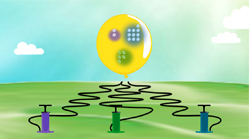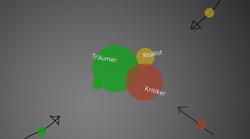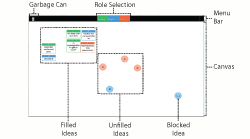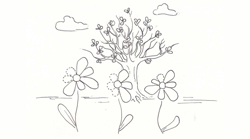A Comparison of Cooperative and Competitive Visualizations
Decades of research suggest that cooperation leads to greater productivity than competition. However, most of the existing group mirror visualizations achieve an increase in productivity and better self-regulation by enabling a direct comparison of performance within the group. We present a study that investigates the influence of different types of visualizations on collaboration. The visualizations present the group’s performance either in a more cooperative or more competitive way. Results indicate that groups that see a combination of individual and group performance(mixed condition) are more productive, more satisfied with their results and participate in a more balanced way.
![[Foto]](sarah-tausch.jpg)
Sarah Tausch
Ich bin mittlerweile leider nicht mehr an der LMU tätig, aber natürlich weiterhin unter sarah.tausch ät ifi.lmu.de erreichbar.
Forschungsschwerpunkte
- Feedback Tools (Group Mirrors) to support collaborative work in small co-located groups
- Awareness Systems and Ambient Feedback
Forschungsprojekte


Supporting the Disney Method II
The Disney method is a collaborative creativity technique that uses three roles - dreamer, realist and critic - to facilitate the consideration of differ-ent perspectives on a topic. Especially for novices it is important to obtain guid-ance in applying this method. One way is providing groups with a trained mod-erator. However, feedback about the group’s behavior might interrupt the flow of the idea finding process. We built and evaluated a system that provides am-bient feedback to a group about the distribution of their statements among the three roles. Our preliminary field study indicates that groups supported by the system contribute more and roles are used in a more balanced way while the visualization does not disrupt the group work.
The Disney method is a collaborative creativity technique that uses three roles - dreamer, realist and critic - to facilitate the consideration of differ-ent perspectives on a topic. Especially for novices it is important to obtain guid-ance in applying this method. One way is providing groups with a trained mod-erator. However, feedback about the group’s behavior might interrupt the flow of the idea finding process. We built and evaluated a system that provides am-bient feedback to a group about the distribution of their statements among the three roles. Our preliminary field study indicates that groups supported by the system contribute more and roles are used in a more balanced way while the visualization does not disrupt the group work.

Supporting the Disney Method I
We developed an interactive system supporting groups using the Disney Method. Each group member is provided with a tablet to enter ideas and choose the role in which a contribution is made, represented by different colors. We conducted a user study with eight groups and compared two versions: a baseline without additional support and a version with an additional feedback mechanism providing functional feedback about the distribution of the roles. Our main contributions are: (1) a system using feedback to support the Disney method and (2) results indicating that functional feedback can help modest group members to engage more in the group process.
We developed an interactive system supporting groups using the Disney Method. Each group member is provided with a tablet to enter ideas and choose the role in which a contribution is made, represented by different colors. We conducted a user study with eight groups and compared two versions: a baseline without additional support and a version with an additional feedback mechanism providing functional feedback about the distribution of the roles. Our main contributions are: (1) a system using feedback to support the Disney method and (2) results indicating that functional feedback can help modest group members to engage more in the group process.

Supporting Debates with a Group Mirror
We investigate a novel real-time feedback system that enables a subtle and unobtrusive interaction between learners and trainers in the context of debates. Novices to structured debates practiced in debate clubs need to learn fundamental rhetorical skills. The argumentation follows a well-defined structure: claim, explanation and example. Learners receive feedback about their rhetorical performance in the end of debates which complicates the immediate adaptation. We introduce a real-time feedback system enabling an unobtrusive teacher-student dialog. Teachers virtually communicate their assessment about the presented performance using a smart phone; students adapt the structure of their debate according to the visual feedback that is presented on a tablet.
We investigate a novel real-time feedback system that enables a subtle and unobtrusive interaction between learners and trainers in the context of debates. Novices to structured debates practiced in debate clubs need to learn fundamental rhetorical skills. The argumentation follows a well-defined structure: claim, explanation and example. Learners receive feedback about their rhetorical performance in the end of debates which complicates the immediate adaptation. We introduce a real-time feedback system enabling an unobtrusive teacher-student dialog. Teachers virtually communicate their assessment about the presented performance using a smart phone; students adapt the structure of their debate according to the visual feedback that is presented on a tablet.

Groupgarden
We present Groupgarden, a metaphorical group mirror providing feedback about individual as well as group performance. We conducted two user studies. We could validate the effectivity of Groupgarden in a preliminary study that compared brainstorming sessions supported by Groupgarden with sessions without additional support. In a second study, we examined the influence of the location of the feedback, wall vs. table, on group behavior. Our results indicate that the location does not influence efficiency of brainstorming, while each location has different benefits.
We present Groupgarden, a metaphorical group mirror providing feedback about individual as well as group performance. We conducted two user studies. We could validate the effectivity of Groupgarden in a preliminary study that compared brainstorming sessions supported by Groupgarden with sessions without additional support. In a second study, we examined the influence of the location of the feedback, wall vs. table, on group behavior. Our results indicate that the location does not influence efficiency of brainstorming, while each location has different benefits.
Publikationen
| 2016 | |
Download |
Sarah Tausch, Stephanie Ta, Heinrich Hussmann
A Comparison of Cooperative and Competitive Visualizations for Co-located Collaboration In Proceedings of the SIGCHI Conference on Human Factors in Computing Systems (CHI '16). San Jose, CA, USA, May 7 - 12, 2016. ACM, New York, NY, USA. |
| 2015 | |
Download |
Emanuel von Zezschwitz, Daniel Buschek, Axel Hoesl, Henri Palleis, Hanna Schneider, Tobias Stockinger, Simon Stusak, Sarah Tausch, Andreas Butz, Heinrich Hussmann
Human Computer Interaction in the Internet of Things Era Media Informatics Advanced Seminar, Summer Term 2015 (bib) |
Download |
Sarah Tausch, Fabius Steinberger, Heinrich Hussmann
Thinking like Disney: Supporting the Disney Method Using Ambient Feedback Based on Group Performance In Proceedings of the 15th IFIP TC13 International Conference on Human-Computer Interaction, INTERACT '15. Bamberg, Germany, September 14-18, 2015. ACM, New York, NY, USA. (bib) |
Download |
Sarah Tausch, Fabian Nußberger, Heinrich Hussmann
Supporting the Disney Method with an Interactive Feedback System In Extended Abstracts of the 33rd Annual ACM Conference on Human Factors in Computing Systems, CHI '15. Seoul, Korea, April 18 - 23, 2015. ACM, New York, NY, USA. |
Download |
Sarah Tausch
Investigating the Different Characteristics of Group Mirrors Doctoral Colloquium at the 18th ACM Conference on Computer Supported Cooperative Work and Social Computing (CSCW 2015), Vancouver, BC, Canada, March 14-18, 2015 |
| 2014 | |
Download |
Sarah Tausch, Doris Hausen, Ismail Kosan, Andrey Raltchev, Heinrich Hussmann
Groupgarden: Supporting Brainstorming through a Metaphorical Group Mirror on Table or Wall In Proceedings of the 8th Nordic Conference on Human-Computer Interaction, NordiCHI'14. Helsinki, Finland, October 26-30, 2014. |
Download |
Alina Hang, Daniel Buschek, Alexander De Luca, Axel Hoesl, Sebastian Loehmann, Henri Palleis, Simon Stusak, Sarah Tausch, Emanuel von Zezschwitz, Andreas Butz, Heinrich Hussmann
Special Aspects of Usability Media Informatics Advanced Seminar, Summer Term 2014 (bib) |
Download |
Tina Kothe, Ida Buchwald, Sarah Tausch, Anja Mohr, Heinrich Hussmann
Art Education in the Digital World. A picture book as app Workshop Interactive e-Books for Children: Art Education in the Digital World. A picture book as app. In conjunction with the 2014 Conference on Interaction Design and Children (IDC 2014), Aarhus, Denmark, June 17-20, 2014 |
Download |
Andreas Butz, Gilbert Beyer, Alina Hang, Doris Hausen, Fabian Hennecke, Felix Lauber, Sebastian Loehmann, Henri Palleis, Sonja Rümelin, Bernhard Slawik, Sarah Tausch, Julie Wagner, Heinrich Hussmann
Out of Shape, Out of Style, Out of Focus: Wie sich Computer besser in unseren Alltag integrieren (lassen) In Informatik Spektrum: Organ der Gesellschaft für Informatik e.V. und mit ihr assoziierter Organisationen. Online, May 2014. |
Download |
Bernd Huber, Sarah Tausch, Heinrich Hussmann
Supporting Debates with a Real-Time Feedback System In Extended Abstracts of the 32nd SIGCHI Conference on Human Factors in Computing Systems, CHI '14. Toronto, Canada, April 26 - May 1, 2014. ACM, New York, NY, USA. |
Download |
Emanuel von Zezschwitz, Alina Hang, Doris Hausen, Renate Häuslschmid, Axel Hoesl, Felix Lauber, Sebastian Loehmann, Henri Palleis, Bernhard Slawik, Simon Stusak, Sarah Tausch, Andreas Butz, Heinrich Hussmann
Secondary Tasks Media Informatics Advanced Seminar, Winter Term 2013/2014 (bib) |
| 2013 | |
Download |
Max Maurer, Alexander De Luca, Alina Hang, Doris Hausen, Fabian Hennecke, Sebastian Loehmann, Henri Palleis, Hendrik Richter, Simon Stusak, Aurélien Tabard, Sarah Tausch, Emanuel von Zezschwitz, Franziska Schwamb, Heinrich Hussmann, Andreas Butz
Long-Term Experiences with an Iterative Design of a QR-Code-Based Payment System for Beverages In Proceedings of the 14th IFIP TC13 Conference on Human-Computer Interaction (INTERACT 2013). Cape Town, South Africa, September 2-6 2013. |
Download |
Doris Hausen, Fabian Hennecke, Nora Broy, Alina Hang, Sebastian Loehmann, Max Maurer, Sonja Rümelin, Sarah Tausch, Emanuel von Zezschwitz, Andreas Butz, Heinrich Hussmann
Visualize! Media Informatics Advanced Seminar, Summer Term 2013 (bib) |
Download |
Henri Palleis, Alina Hang, Doris Hausen, Fabian Hennecke, Felix Lauber, Sonja Rümelin, Simon Stusak, Sarah Tausch, Emanuel von Zezschwitz, Andreas Butz, Heinrich Hussmann
Beyond the Desktop Media Informatics Advanced Seminar, Winter Term 2012/2013 (bib) |
Download |
Sarah Tausch, Heinrich Hussmann
Designing Group Mirror Systems for Collaboration Workshop CSCW and education: Viewing education as a site of work practice. In conjunction with the 16th ACM Conference on Computer Supported Cooperative Work and Social Computing (CSCW 2013), San Antonio, Texas, Feb 23-27, 2013 |
Reviewed For
2016: CSCW, JCSCW, CHI
2015: TEI, CHI
2014: TEI, CHI, DIS
2013: MUM, Personal and Ubiquitous Computing (Journal)
Student Volunteer
2014: VIS
2013: MobileHCI
Offene Abschlussarbeiten
| Sorry. No Data found |
Laufende Themen
| Sorry. No Data found |
Abgeschlossene Themen
Lehre
WS 2016: Fortgeschrittene Themen zu HCI (Gastvortrag)
WS 2015/16: Hauptseminar Medieninformatik
SS 2015: Multimedia-Programmierung
SS 2015: Fortgeschrittene Themen zu HCI (Gastvortrag)
WS 2014/2015: Proseminar Medieninformatik
SS 2014: Medientechnik
WS 2013/2014: Proseminar Medieninformatik
SS 2013: Medientechnik
WS 2012/2013: Digitale Medien
WS 2012/2013: Praktikum Mediengestaltung
WS 2012/2013: Design Workshop 2
WS 2012/2013: Learning in Computer Science
